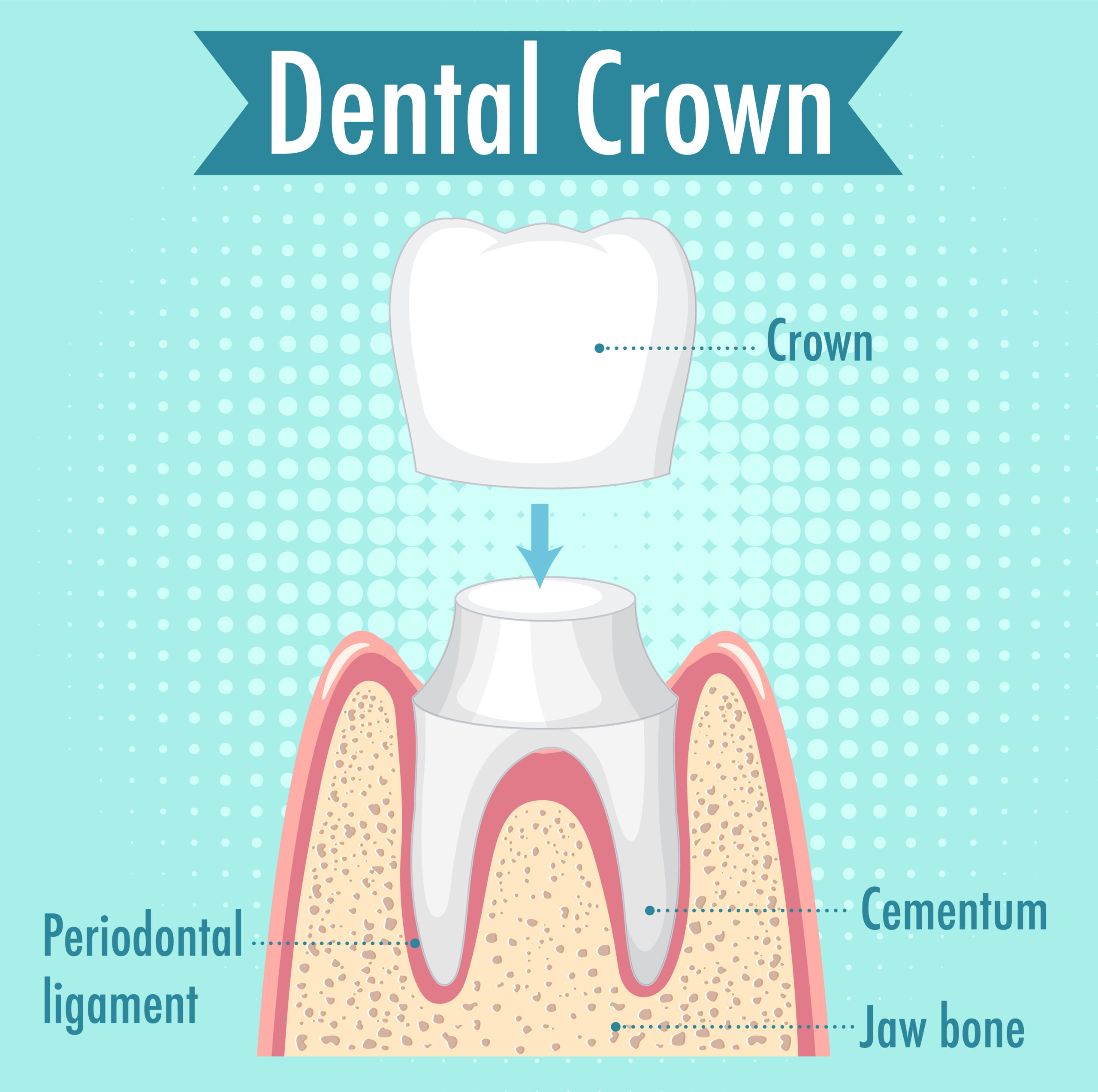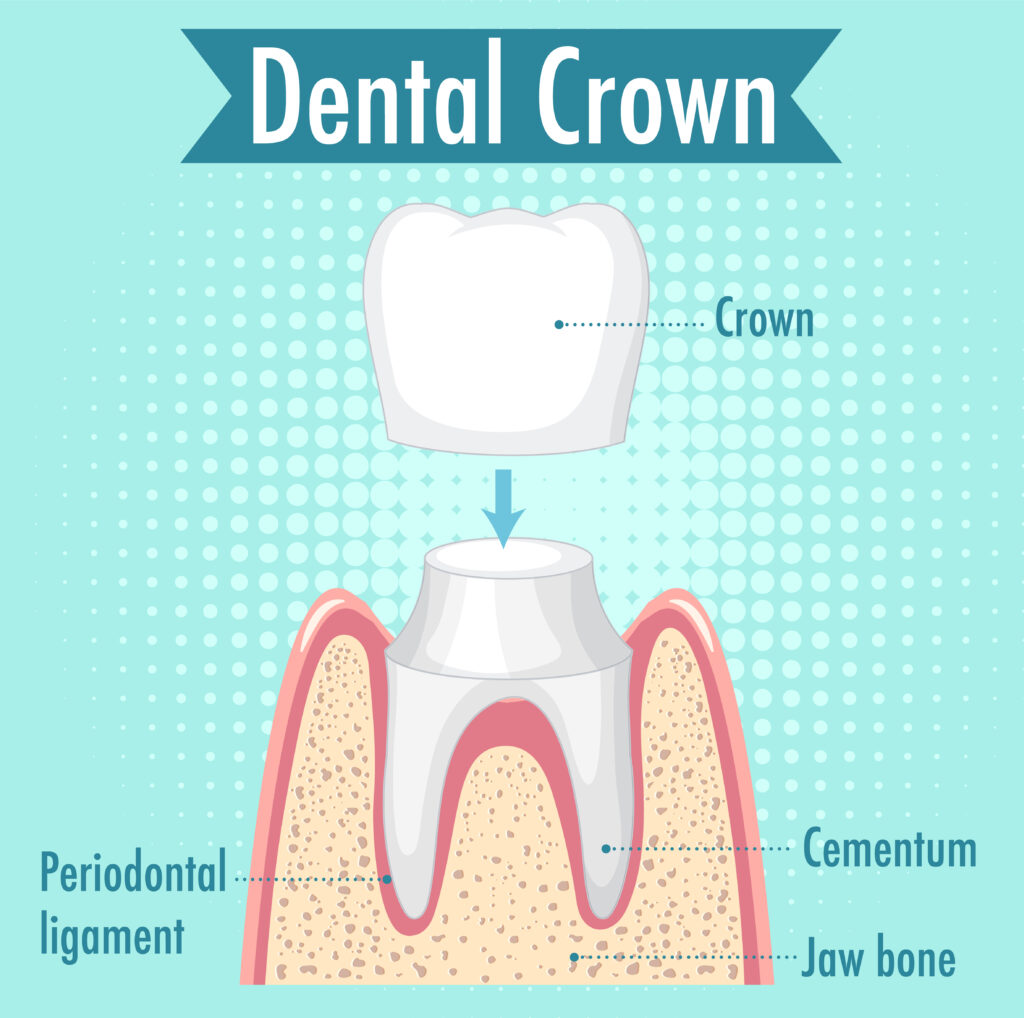Discover the Best Choice: Comparing Types of Dental Crowns and Composites

Table of Contents
When it comes to dental care, the choices available can be overwhelming. One particular area where patients often have questions is in the realm of dental crowns and composites.
This article will explore different types of dental crowns and composites. We’ll compare their pros and cons and discuss the factors to consider when choosing the best material for you. By the end of this article, you’ll have a better understanding of the options available to you and feel more confident in making a decision about your dental care.

Introduction to Dental Crowns and Composites
Dental crowns are a common dental treatment used to protect or restore damaged teeth. They can be made from various materials, including porcelain, composite resin, metal, and porcelain-fused-to-metal. Crowns are like little caps that cover up your damaged tooth and make it look brand spanking new. It's like giving your tooth a royal makeover.
Dental composites, on the other hand, are tooth-colored materials used to repair tooth decay or other dental damage. You’ll hear composites referred to as fillings.
What are Dental Crowns?
Like we said above, crowns are custom-made caps that cover the entire visible portion of a tooth, providing strength and protection for damaged teeth.
They’re often used to restore teeth that have severe damage from decay, fractures, or previous dental treatments such as root canals. They’re also great for improving the appearance of discolored or misshapen teeth.
Types of Dental Crowns
a. Porcelain
Porcelain crowns are made from a strong, durable ceramic material that closely resembles the appearance of natural teeth. They’re aesthetic and can be custom-made to match the color, shape, and size of your existing teeth. Porcelain crowns are often used for front teeth, where appearance is especially important.
b. Composite Resin
Composite resin crowns are made from a tooth-colored material that’s shaped and molded to fit the tooth. They look more natural than metal crowns and can be a good choice for patients with metal allergies or sensitivities. They’re typically less expensive than porcelain crowns, but they may not be as durable, especially in high-pressure areas such as the back teeth.
c. Metal
Metal crowns are made from a variety of metals, including gold, silver, and various alloys. They are extremely strong and durable, making them a good choice for back teeth that need to withstand significant biting pressure. However, because they’re made from metal, they can be less aesthetically pleasing than other types of crowns. Some patients may have metal allergies or sensitivities who won’t be able to get this kind.
d. Porcelain-Fused-to-Metal
Porcelain-fused-to-metal (PFM) crowns consist of a metal base with a layer of porcelain on top. This combination provides the strength and durability of a metal crown, with the natural appearance of a porcelain crown. PFM crowns can be used for both front and back teeth, but they may be more prone to chipping or wear than all-porcelain or all-metal crowns.
What are Dental Composites?
Dental composites are tooth-colored materials made from a mixture of plastic and glass or ceramic particles.
They’re used to repair tooth decay, fractures, or other dental damage, much like crowns. The difference is that they don’t cover as much of the tooth.
While crowns are like the superheroes of dental work, swooping in to save the day when damage or decay is serious. However for less significant tooth decay, fillings are a good solution. But if the damage is significant, you’ll need a crown instead.
Comparing Composite Crowns vs Porcelain Crowns
a. Aesthetics
Both composite crowns and porcelain crowns offer a natural, tooth-colored appearance. Porcelain crowns are often considered more aesthetically pleasing due to their translucency, which closely mimics the appearance of natural tooth enamel.
However, composite crowns can also provide a very natural appearance, and advances in materials and techniques have made it increasingly difficult to tell the difference between the two.
b. Durability
In general, porcelain crowns are considered to be more durable than composite crowns. Porcelain is a strong, long-lasting material that can withstand significant biting pressure, making it a good choice for both front and back teeth.
Composite crowns, while still strong, may be more prone to wear and chipping, especially in high-pressure areas such as the back teeth.
c. Cost
Composite crowns are typically less expensive than porcelain crowns, making them a more budget-friendly option for many patients.
However, it's important to keep in mind that the lower cost of composite crowns may be offset by their potentially shorter lifespan and the need for more frequent replacements.
d. Procedure
The procedure for placing both composite crowns and porcelain crowns is similar, involving the removal of damaged tooth structure, the shaping of the remaining tooth, and the placement of a temporary crown while the permanent crown is being made.
The primary difference between the two procedures is the material used to create the permanent crown. In some cases, composite crowns can be placed in a single appointment using a chairside process, while porcelain crowns typically require a separate appointment for placement.
Factors to Consider When Choosing the Type of Dental Crowns
When choosing a dental crown material, there are several factors to consider, including:
Aesthetics: How important is the appearance of your crown? Both composite and porcelain options offer a natural appearance, but porcelain may be considered more aesthetically pleasing due to its translucency.
Durability: Do you need a crown that can withstand significant biting pressure, or are you more concerned about wear and chipping? Porcelain crowns are generally more durable than composite crowns. They can last anywhere from 5 to 15 years.
Cost: What is your budget for dental treatment? Composite crowns are typically less expensive than porcelain crowns, but may need to be replaced more frequently.
Metal allergies or sensitivities: Do you have any allergies or sensitivities to metals? If so, you may want to consider a composite or porcelain crown, as the metal kind can cause irritation for some patients.
Dental history: Have you had issues with previous crowns or other dental treatments? Dr. McVey can help you determine if a particular crown material may be more suitable for your specific needs.
Pros and Cons of Different Types of Dental Crowns
Each type of dental crown has its advantages and disadvantages, which should be carefully considered when making a decision about your dental treatment:
Porcelain crowns:
- Pros include their natural appearance, strength, and durability.
- Cons include their higher cost and the potential for chipping or wear.
Composite crowns:
- Pros include their natural appearance, lower cost, and suitability for patients with metal allergies or sensitivities.
- Cons include their lesser durability compared to porcelain crowns and potential for wear and chipping.
Metal crowns:
- Pros include their strength, durability, and longevity.
- Cons include their metallic appearance and potential for irritation in patients with metal allergies or sensitivities.
Porcelain-fused-to-metal crowns:
- Pros include their combination of strength and natural appearance.
- Cons include their potential for chipping or wear and a higher cost compared to composite crowns.
Consultation with Dr. McVey: Making the Final Decision
Ultimately, the decision about which type of dental crown is best for you will depend on your specific needs, preferences, and budget. It's essential to discuss your options with Dr. McVey’s team, who can provide you with personalized recommendations based on your unique situation. We’ll consider factors such as the location of the tooth, your oral health history, and your budget when making a recommendation.
During your consultation, Dr. McVey will examine your teeth and discuss the pros and cons of each option with you. By the end of your consultation, you should have a clear understanding of the pros and cons of each type of crown, and feel confident in making a decision about your dental care.
Conclusion
Choosing the right type of dental crown can feel overwhelming, but by understanding the pros and cons of each option, you can make an informed decision about your dental care.
Whether you opt for a porcelain, composite resin, metal, or porcelain-fused-to-metal crown, the most important thing is to take care of your teeth and maintain good oral hygiene habits. By doing so, you can ensure that your new crown will last for years to come, protecting and strengthening your teeth for a lifetime of healthy smiles.
Now that you know more about crowns and composites, you can book your appointment by giving us a call at 620-275-9157.
Important Links:
- (https://drrandallmcvey.com/veneers-and-crowns) Dr. McVey
- (https://drrandallmcvey.com/blog/3-ways-afford-dental-care/) Dr. McVey
- (https://www.healthline.com/find-care/articles/dentists/dental-crown#types) Healthline
- (https://allreddentistry.com/whats-the-difference-between-a-composite-filling-and-a-crown/) All Red Family Dentistry
- (https://hoverdental.com/when-you-need-a-crown-and-when-composite-will-do/) Hover Dental Group
The information available on the Website is for general health information only and is not intended to be a substitute for professional medical advice, diagnosis or treatment. You should not rely exclusively on information provided on the Website for your health needs. All specific medical questions should be presented to your own health care provider and you should seek medical advice regarding and before making any changes related to your health.
If you choose to use the information available on the Website without prior consultation with and consent of your physician, you are agreeing to accept full responsibility for your decisions and agreeing to hold harmless Randall K. McVey, DMD PA, its agents, employees, contractors, and any affiliated companies from any liability with respect to injury or illness to you or your property arising out of or connected with your use of this information.
MedicAL DISCLAIMER
Patient Portal
help
Disclaimers
HIPAA
Accessibility
Privacy Policy & Cookie Policy
Terms & Conditions